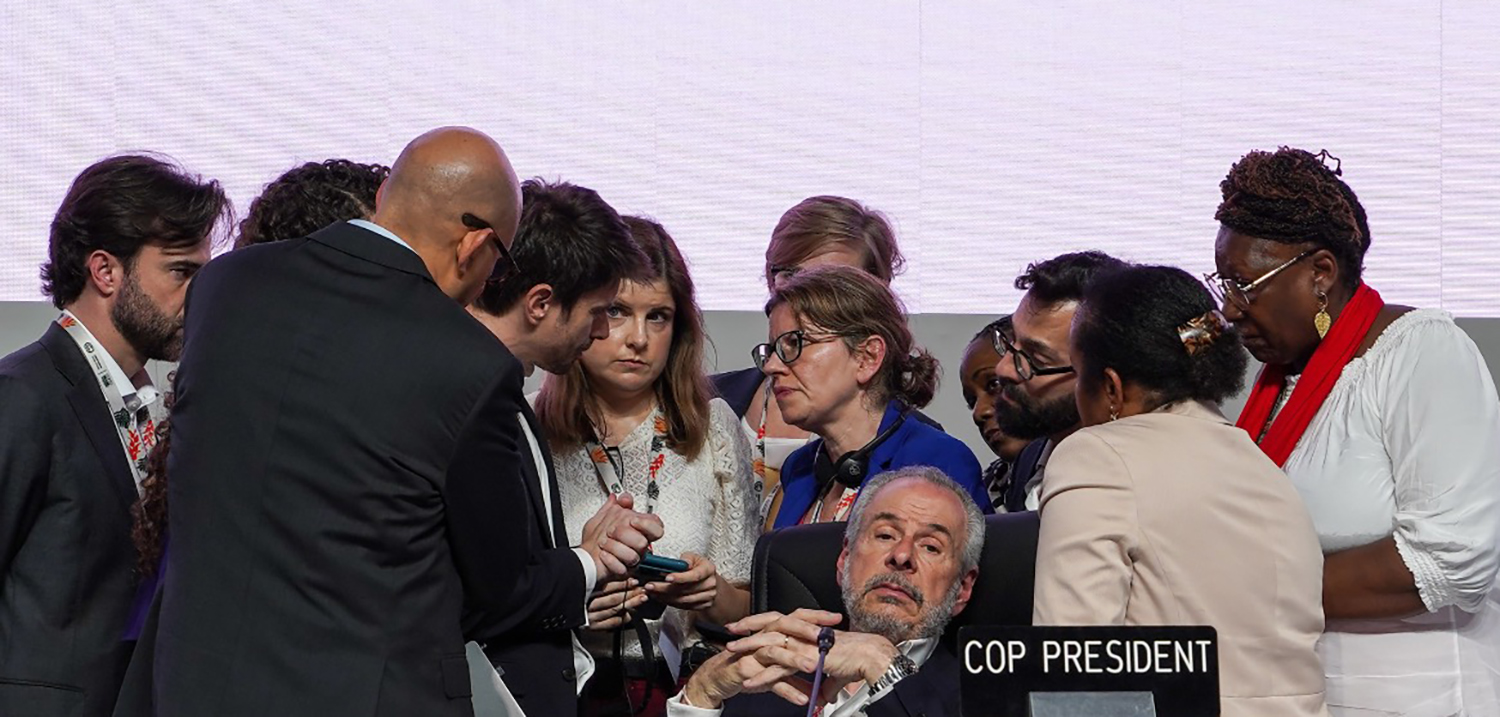On Saturday night, 21 November 2025, the gavel was struck by COP30 president André Corrêa do Lago, concluding a divisive and eventful global climate summit in the Amazonian city of Belém, Brazil.
Running nearly 27 hours over schedule with intense, all-night negotiations, some delegates and commentators from the Global South believe the summit fell short of achieving crucial, time-bound commitments and that delegates failed to secure a robust agreement on adaptation, a clear fossil fuel phase-out timeline or an actionable forest roadmap.
The parties at COP30 in the end adopted the Belém Political Package to resolve the difficult issues raised at the beginning of the COP: Nationally Determined Contribution ambition, trade and finance, as described by Maesela Kekana, South Africa’s chief climate negotiator.
Included in this is the “Mutirão Decision” (a Portuguese word meaning “collective efforts”), which was intended to unify divisive issues during the summit, including finance, trade and the 1.5°C temperature goal – but a number of concerns remain.
Martha Bekele, co-founder of Development Transformations and from the Ethiopian delegation at COP30, said: “The Global Mutirao text is another chapter in the long story of how Africa keeps conceding ground, while historical emitters walk away with a responsibility that does not reflect the extent of climate debt.”
The outcome was criticised by many in the global climate community as failing to meet the scale and urgency of the crisis, but Kekana said that they viewed the results differently, welcoming key institutional progress, particularly concerning adaptation and a just transition.
For South Africa and the wider African group, which emphasised adaptation and equity going into the talks, the outcomes presented a mixture of limited progress, deep disappointment and geopolitical tension.
Corrêa do Lago said: “As we leave Belém, this moment must not be remembered as the end of a conference, but as the beginning of a decade of turning the game… The spirit we built here does not end with the gavel; it continues in every government meeting, every boardroom and trade union, every classroom, laboratory, forest community, large city and coastal town.”
The shortfall on fossil fuels and adaptation targets
Climate Action Network International (CAN) welcomed the adoption of the Just Transition mechanism as one of the strongest rights-based outcomes in the history of UN climate negotiations.
But they warned that COP30 has produced weak outcomes in the very areas that are critical to ensuring justice for vulnerable and frontline communities – including a dangerously weak outcome on adaptation finance, which leaves little hope for affected communities.
“The real fault line running through COP30 was the refusal of developed countries to agree to the provision of finance across all areas. Their blocking of commitments on adaptation finance, mitigation ambition and the transition away from fossil fuels directly weakened the overall outcome,” said CAN, which had observers from South Africa attending the COP.
The consensus required for ambitious targets proved elusive. Despite calls from Brazilian President Luiz Inácio Lula da Silva for roadmaps to justly and strategically “overcome dependence on fossil fuels” and “reverse deforestation”, the final Mutirão text adopted at the closing plenary contained no reference to a fossil fuel roadmap.
This was despite a strong coalition of 86 countries supporting the call for a roadmap. The Brazilian presidency eventually announced that roadmaps on fossil fuels and deforestation would be brought forward at the next COP, but these would sit outside the formal UN process.
/file/attachments/2984/6_302921.jpg)
This failure to secure binding phase-out commitments drew sharp criticism from African delegates, who stressed that the continent continues to bear the burden of historical emissions without receiving adequate support.
Bekele described the outcome as “a politically necessary but ultimately familiar multilateral outcome that once again fails Africa”.
Adding to the disappointment, Koaile Monaheng, political strategist for Greenpeace Africa, said that by ignoring the root cause of the climate crisis (fossil fuels), nations were not only postponing solutions but also deepening injustice.
Monaheng believed that the summit missed an opportunity to reclaim the spirit of the 1992 Rio summit, where nations agreed that historical polluters should reduce their emissions and vacate space for the rest of the world to develop sustainably.
The adaptation battle: late targets and finance concerns
Adaptation – preparing for and adjusting to current and future climate impacts – was one of Africa, including South Africa’s, top priorities entering COP30. The key outcome centred on the Global Goal on Adaptation (GGA).
Negotiators finally agreed to adopt the “Belém Adaptation Indicators”, a greatly reduced set of 59 indicators (from the expected 100) intended to track global progress on adaptation.
Kekana welcomed the adopted indicators, noting that countries can now start using these and improve them over time through the two-year “Belém-Addis vision” technical process established by the decision.
But the GGA adoption was deeply contentious, particularly on how the indicators would be implemented and financed. It appears that the GGA indicators went from the contested 100 indicators to 59 at about 3am during negotiation on Friday.
Panama, supported by other Latin American countries and the EU, criticised the indicators for being “pushed at 3am with no metadata and no methodology”. The final text emphasised that the indicators are “voluntary, non-prescriptive, non-punitive, facilitative, global in nature” and that they do not create new financial obligations or commitments.
/file/attachments/2984/5_337055.jpg)
/file/attachments/2984/4_977314.jpg)
For least-developed countries (LDCs), including many African states, indicators alone are meaningless without the means of implementation, specifically adaptation finance.
Lina Yassin, an LDC technical lead from Sudan, noted: “Indicators only show you what’s going on. So beyond indicators, we’re asking for adaptation finance.”
The LDC group had called for tripling adaptation finance by 2030. But the final text only calls for efforts to at least triple adaptation finance by 2035. This five-year delay and lack of a firm commitment generated strong pushback.
Natalie Unterstell, a member of the COP30 Adaptation Council, highlighted the uncertainty: “If we won’t even know the real numbers of adaptation finance’s 2025 baseline until 2028, that’s a three-year blindfold. Without a crystal-clear signal on adaptation finance, with a number, this text risks becoming another exercise in deferred responsibility.”
We remain concerned that the base is low – a doubling of a small amount – too small to meet the adaptation needs of developing countries.
Sherelee Odayar, Greenpeace Africa’s Oil & Gas Campaign lead, called the 2035 target “way too late for developing countries when we’re already sliding into climate breakdown”. She also rejected the idea that developed countries were linking mitigation and adaptation support, calling this stance “simply unacceptable”.
Just Transition and transparency
Despite the slow progress on the headline ambition, South Africa celebrated success in two core areas: the Just Transition and transparency.
South Africa was instrumental in advocating for the adoption of a mechanism for the implementation of the UAE Just Transition Work Programme (JTWP). Parties ultimately agreed to “develop a just transition mechanism to enable just transitions and enhance international cooperation, technical assistance, capacity building and knowledge sharing”.
Civil society welcomed the mechanism’s accompanying decision text, which contained what was described as “the most progressive rights-based framing we have ever seen in a COP decision”.
/file/attachments/2984/3_221500.jpg)
This framework included recognition of human rights, labour rights, the right to a clean environment and the inclusion of marginalised groups as core to achieving more ambitious climate action. The adoption of the JTWP text was met with extended applause during the closing plenary.
Furthermore, South Africa confirmed its commitment to the transparency requirements of the Paris Agreement, noting that it submitted its first Biennial Transparency Report in December 2024.
Kekana said the country was delighted with decisions by the COP on transparency, including the landmark outcome on the Consultative Group of Experts, which was “vitally important for building transparency capacity in our countries”.
/file/attachments/2984/2_817926_363aae7508f0389dd586322c198661e7.jpg)
What’s next for global climate action?
The final outcome of COP30 reflects the ongoing conflict between the imperative for radical, immediate action and the entrenched processes of multilateral diplomacy.
While UN Climate Change executive secretary Simon Stiell said that COP30 showed climate cooperation was alive and kicking, keeping humanity in the fight for 1.5°C, others viewed the persistence of the current system as “actively harmful”.
COP30 showed that climate cooperation is alive and kicking, keeping humanity in the fight for a livable planet, with a firm resolve to keep 1.5°C within reach.
From a South African standpoint, COP30 delivered mechanisms such as the GGA indicators and the Just Transition mechanism, which align with its key priorities for adaptation and equitable transformation.
Kekana said: “South Africa stands ready to work with all parties to ensure these decisions translate into real action on the ground. We reaffirm our commitment to equity, ambition and international cooperation in addressing the climate crisis.”
The next major climate discussions will take place in Antalya, Turkey, for COP31, with Australia set to chair the talks following the negotiations at COP30. DM
Kristin Engel is a freelance environmental journalist and a Danida Fellow participating in the Danida Fellowship Centre’s 2025 learning programme, “Reporting from the frontline of the global climate crisis in an era of fake news”. The centre is a public self-governing institution under the Ministry of Foreign Affairs of Denmark.





 COP30 President André Corrêa do Lago looking tired during a break after Colombia's intervention of the COP30 closing plenary in Belém, Brazil, on 22 November 2025. (Photo: UN Climate Change/ Lara Murillo)
COP30 President André Corrêa do Lago looking tired during a break after Colombia's intervention of the COP30 closing plenary in Belém, Brazil, on 22 November 2025. (Photo: UN Climate Change/ Lara Murillo)